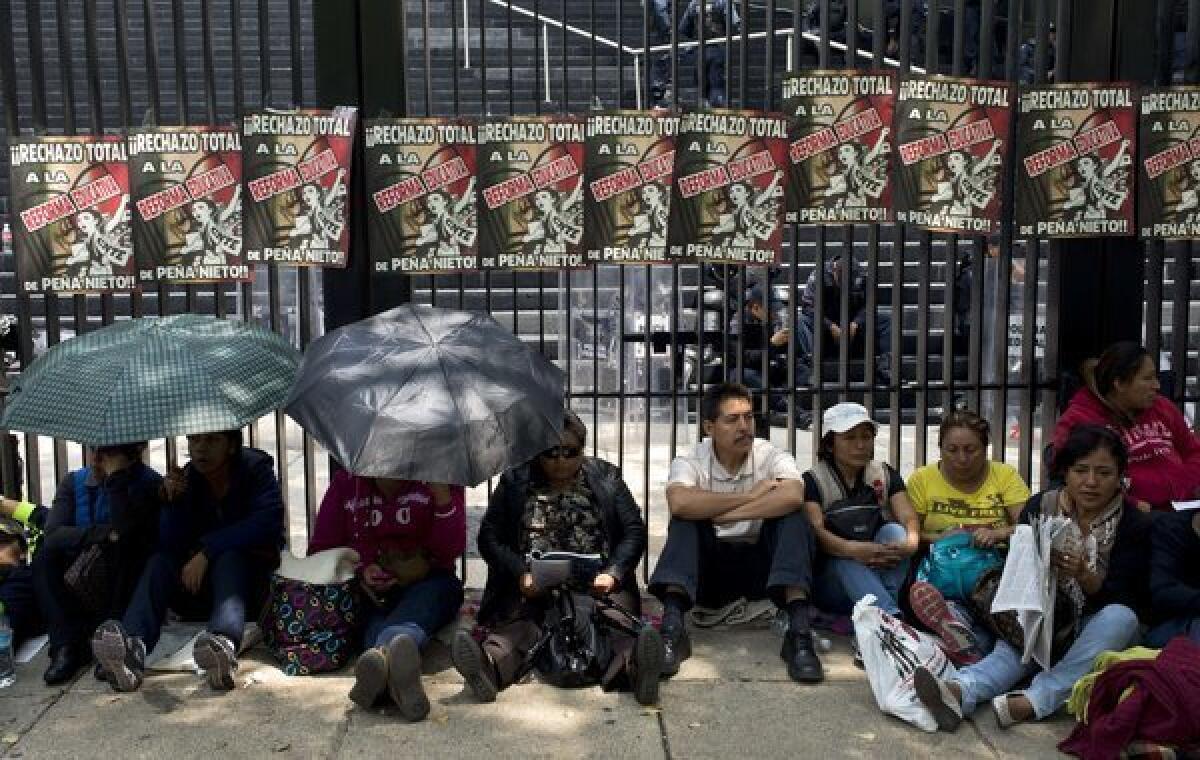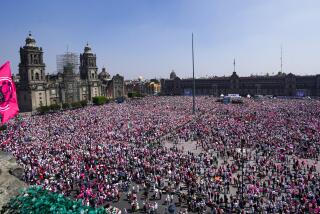Thousands of protesting teachers bring chaos to Mexico’s capital

MEXICO CITY — Thousands of striking teachers have invaded this capital, shut down both houses of Congress, forced changes in the route of an international marathon and generally created mayhem at levels not seen in a long time in what is always a chaotic city.
The teachers, part of a so-called dissident union that routinely opposes government actions, are demonstrating against a proposed education reform that, among other components, would require mandatory evaluations of teachers’ skills.
On Friday, several thousand teachers were marching down a major city highway en route to the airport, authorities said.
“Mexico City held hostage!” blasted the banner headline in Friday’s Reforma newspaper. Throughout the week, teachers have also staged massive sit-ins in downtown’s iconic Zocalo, or plaza, and outside government buildings. They have repeatedly shut down Reforma Boulevard, the main thoroughfare, tying traffic in gargantuan knots.
A group on Thursday swarmed a hotel where politicians were holed up, reportedly screaming, “Go for the suits!” (link in Spanish)
There are far-reaching political implications coming out of this mess. President Enrique Peña Nieto has staked his young government on an agenda of reforms, including education and energy. Most reforms received wide support, in theory. But the fight over the education bill shows that when it comes to hashing out the details, the president can face stiff and disruptive opposition that could ultimately doom his plans.
And the mayor of Mexico City, Miguel Angel Mancera, is coming under severe criticism for his failure to better secure roadways and public buildings. “We will not let the city become a battle ground,” he said.
Pundits noted that since the 1968 massacre of demonstrating students by Mexican security forces, authorities here are reluctant to crack down on protest marches. Yet several suggested there must be a middle ground between allowing anarchy and shedding blood.
Earlier in the week, the demonstrators at different times surrounded the Senate and lower house of Congress. The protests forced legislators to move their activities to a bank complex, where they could be seen voting from floors crowded with folding chairs. One senator said the forced transfer was “practically a coup d’etat.”
The legislators were debating the very education bill that triggered the unrest. They eventually passed some elements of the bill but postponed the especially controversial portion involving teacher evaluations, apparently bowing to pressure.
[Updated 2:13 p.m. PDT, Aug. 23: That feature “is the heart of the reform -- the game-changer,” said Claudio X. Gonzalez, president of Mexicanos Primero, an education advocacy group. It would for the first time set up a meritocracy for teachers and principals, he said, ending the current practice of buying and selling teaching posts or passing them on to heirs, without any testing of qualifications.
“What’s at stake is not just this reform but the administration of President Peña Nieto and his entire reform agenda,” he said.]
Mexico has one of the worst-performing educational systems in the hemisphere. Proponents have said an overhaul is necessary to raise the level of student performance and break the overwhelming grip on schools exercised by teachers unions. The unions have great leeway in deciding who is hired or fired and in spending millions of dollars of public money without accounting for it in a transparent fashion, critics say.
But the union spearheading this week’s demonstrations says the reform does not address fundamental problems such as miserly budgets, especially in the poorer parts of Mexico.
“It is an attack on the teaching profession and does absolutely nothing to help improve education,” Francisco Bravo, one of the protest leaders, said in a news conference. The union is the National Coordinator of Education Workers (CNTE), and is a junior counterpart to the much larger National Syndicate of Education Workers (SNTE), whose legendary and often reviled onetime “president-for-life,” Elba Esther Gordillo, was arrested this year on embezzlement charges.
About 26 million children were to have returned to classes Monday after summer break, but about 2 million, mostly in violent or impoverished states such as Michoacan and Oaxaca, are without school because their teachers are on strike, officials said.
ALSO:
Toll rises in deadly explosions outside two Lebanon mosques
As Obama expresses caution, aides consider air strikes in Syria
Gang rape of photojournalist shocks India; 1 arrested, 4 sought
More to Read
Start your day right
Sign up for Essential California for news, features and recommendations from the L.A. Times and beyond in your inbox six days a week.
You may occasionally receive promotional content from the Los Angeles Times.







